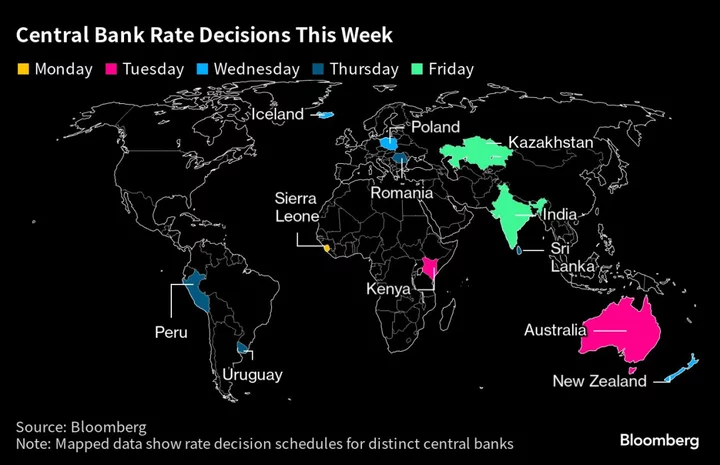
Fed and ECB Tread Hopefully Into Final Stretch of 2023
Policymakers from Washington to Frankfurt head into the final quarter of 2023 with tentative grounds for optimism that
2023-10-01 13:56
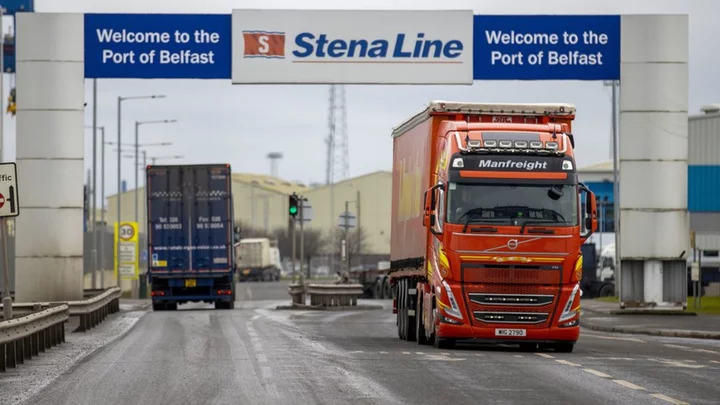
Brexit: New system begins for moving goods from GB to NI
A key part of the Windsor Framework is implemented with a system of "green and red lanes" at NI ports.
2023-10-01 13:16
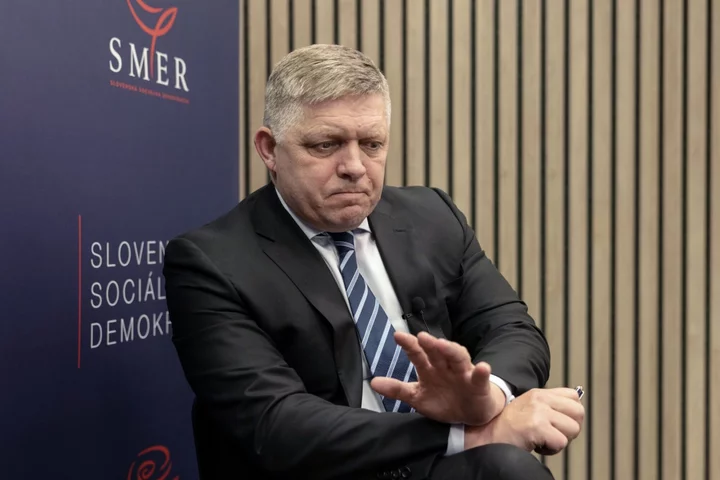
Russia Sanctions Critic Headed for Victory in Slovak Election
A former Slovak premier who derides the European Union’s sanctions against Russia and military aid to Ukraine appeared
2023-10-01 10:24
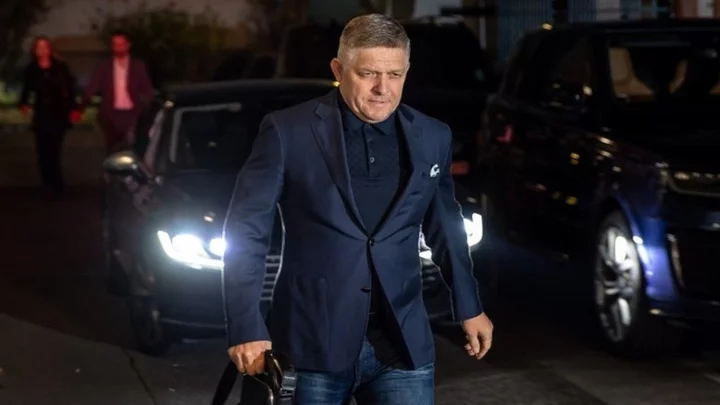
Slovakia elections: Populist party leads as most votes counted
Former PM Robert Fico, who opposes military support for Ukraine, is leading with most votes counted.
2023-10-01 09:53
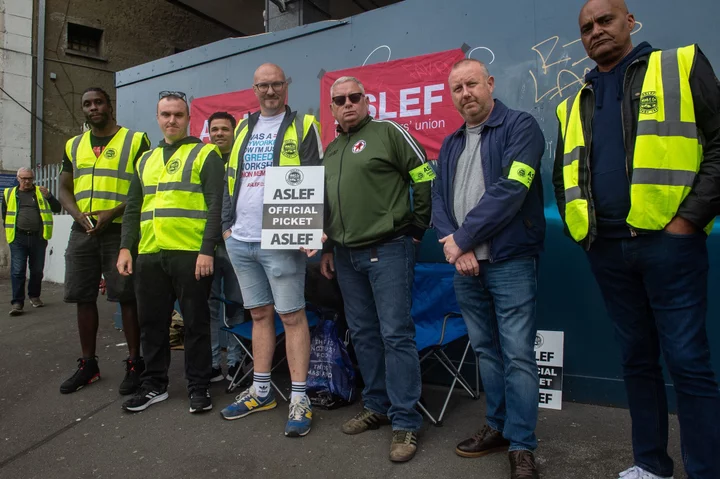
Tory Conference Triggers Week of Train Strikes and Doctors’ Protests
Britain is braced for a week of crippling rail strikes and unprecedented protests by doctors as unions vent
2023-10-01 07:52

UK Retailers Demand Crackdown to Stop Wave of Shoplifting
Retailers ranging from Tesco Plc to Burberry Group Plc have called for immediate action from the UK government
2023-10-01 07:46
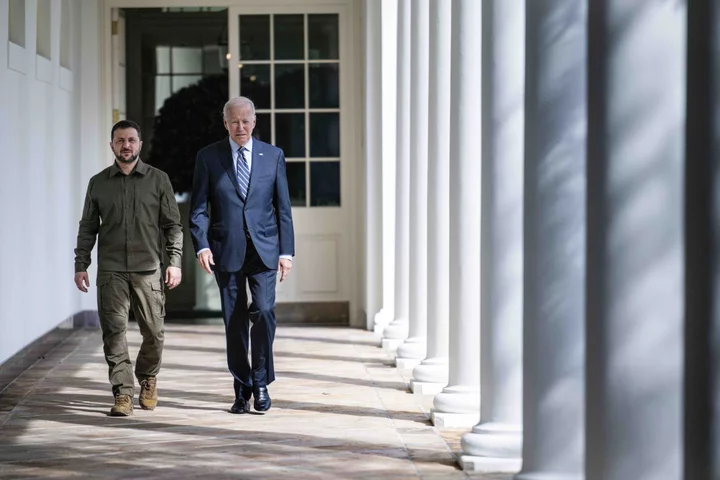
White House Reassures Ukraine With Aid Funding Omitted
President Joe Biden’s administration and senior Republicans sought to reassure Ukraine that US military aid won’t stop after
2023-10-01 05:53
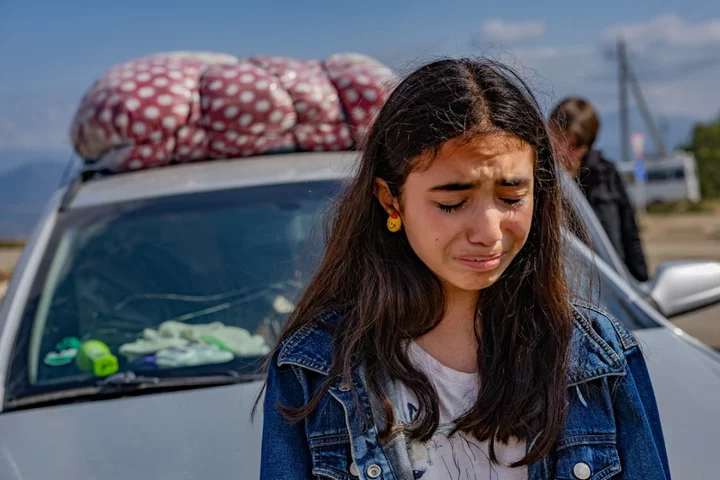
A People lost: The end of Nagorno Karabakh’s fight for independence
It is over and everything is lost. This is the refrain repeated by Armenian families as they take that final step across the border out of their home of Nagorno Karabakh. In just a handful of days more than 100,000 people, almost the entire Armenian population of the breakaway enclave, has fled fearing ethnic persecution at the hands of Azerbaijani forces. The world barely registered it. But this astonishing exodus has vanished a self-declared state that thousands have died fighting for and ended a decades-old chapter of history. Today, along that dusty mountain road to neighbouring Armenia, a few remaining people limp to safety after enduring days in transit. Among them is the Tsovinar family who appear bundled in a hatchback littered with bullet holes, with seven relatives crushed in the back. Hasratyan, 48, the mother, crumbles into tears as she tries to make sense of her last 48 hours. The thought she cannot banish is that from this moment forward, she will never again be able to visit the grave of her brother killed in a previous bout of fighting. “He is buried in our village which is now controlled by Azerbaijan. We can never go back,” the mother-of-three says, as her teenage girls sob quietly beside her. “We have lost our home, and our homeland.” “It is an erasing of a people. The world kept silent and handed us over”. She is interrupted by several ambulances racing in the opposite direction towards Nagorno Karabakh’s main city of Stepanakert, or Khankendi, as it is known by the Azerbaijani forces that now control the streets. Their job is to fetch the few remaining Karabakh Armenians who want to leave and have yet to make it out. “Those left are the poorest who have no cars, the disabled and elderly who can’t move easily,” a first responder calls at us through the window. “Then we’re told that’s it.” As the world focused on the United Nations General Assembly, the war in Ukraine and, in the UK, the felling of an iconic Sycamore tree, a decades old war has reignited here unnoticed. It ultimately heralded the end of Nagorno Karabakh, a breakaway Armenian region, that is internationally recognised as being part of Azerbaijan but for several decades has enjoyed de facto independence. It has triggered the largest movement of people in the South Caucasus since the collapse of the Soviet Union. Azerbaijan has vehemently denied instigating ethnic cleansing and has promised to protect Armenians as it works to re-integrate the enclave. But in the border town of Goris, surrounded by the chaotic arrival of hundreds of refugees, Armenia’s infrastructure minister says Yerevan was now struggling to work out what to do with tens of thousands of displaced and desperate people. “Simply put this is a modern ethnic cleansing that has been permitted through the guilty silence of the world,” minister Gnel Sanosyan tells the Independent, as four new busses of fleeing families arrive behind him. “This is a global shame, a shame for the world. We need the international community to step up and step up now.” The divisions in this part of the world have their roots in centuries-old conflict but the latest iterations of bitter bloodshed erupted during the collapse of the Soviet Union. The Karabakh Armenians, who are in the majority in the enclave, demanded the right to autonomy over the 4,400 square kilometre rolling mountainous region that has its own history and dialect. In the early 1990s they won a bloody war that uprooted Azerbaijanis, building a de facto state that wasn’t internationally unrecognised. That is until in 2020. Azerbaijan, backed by Turkey, launched a military offensive and took back swathes of territory in a six-week conflict that killed thousands of soldiers and civilians. Russia, which originally supported Armenia but in recent years has grown into a colder ally, brokered a fragile truce and deployed peacekeepers. But Moscow failed to stop Baku in December, enforcing a 10-month blockade on Nagorno-Karabakh, strangling food, fuel, electricity and water supplies. Then, the international community stood by as Azerbaijan launched a 24-hour military blitz that proved too much for Armenian separatist forces. Outgunned, outnumbered and weakened by the blockade, they agreed to lay down their weapons. For thirty years the Karabakh authorities had survived pressure from international powerhouses to give up statehood or at least downgrade their aspirations for Nagorno-Karabakh. For thirty years peace plans brokered by countries across the world were tabled and shelved. And then in a week all hope vanished and the self-declared government agreed to dissolve. Fearing further shelling and then violent reprisals, as news broke several Karabakh officials including former ministers and separatist commanders, had been arrested by Azerbaijani Security forces, people flooded over the border. At the political level there are discussions about “reintegration” and “peace” but with so few left in Narargno-Karabakh any process would now be futile. And so now, sleeping in tents on the floors of hotels, restaurants and sometimes the streets of border towns, shellshocked families, with a handful of belongings, are trying to piece their lives together. Among them is Vardan Tadevosyan, Nagorno Karabakh’s minister of health until the government was effectively dissolved on Thursday. He spent the night camping on the floor of a hotel, and carries only the clothes he is wearing. Exhausted he says he had “no idea what the future brings”. “For 25 years I have built a rehabilitation centre for people with physical disabilities I had to leave it all behind. You don’t know how many people are calling me for support,” he says as his phone ringed incessantly in the background throughout the interview. “We all left everything behind. I am very depressed,” he repeats, swallowing the sentence with a sigh. Next to him Artemis, 58 a kindergarten coordinator who has spent 30 years in Steparankert, says the real problems were going to start in the coming weeks when the refugees outstay their temporary accommodation. “The Azerbaijanis said they want to integrate Nagorno Karabakh but how do you blockade a people for 10 months and then launch a military operation and then ask them to integrate?” She asks, as she prepares for a new leg of the journey to the Armenian capital where she hopes to find shelter. “The blockade was part of the ethnic cleansing. This is the only way to get people to flee the land they love.” “There is no humanity left in the world.” Back in the central square of Goris, where families pick through piles of donated clothes and blankets and aid organisations hand out food, the loudest question is: what next? Armenian officials are busy registering families and sending them to shelters in different corners of the country. But there are unanswered queries about long-term accommodation, work and schooling. “I can’t really think about it, it hurts too much,” says Hasratyan’s eldest daughter Lilet, 16, trembling in the sunlight as the family starts the registration process. “All I can say to the world is please speak about this and think about us. “We are humans, people made of blood, like you and we need your help. “ Read More More than 70% of Nagorno-Karabakh's population flees as separatist government says it will dissolve ‘Centuries of history lost’: Armenians describe journey to safety after fall of Nagorno-Karabakh Nagorno-Karabakh: Tearful 16-year-old describes ‘bombing’ while she was in school Why this week's mass exodus from embattled Nagorno-Karabakh reflects decades of animosity
2023-10-01 00:24
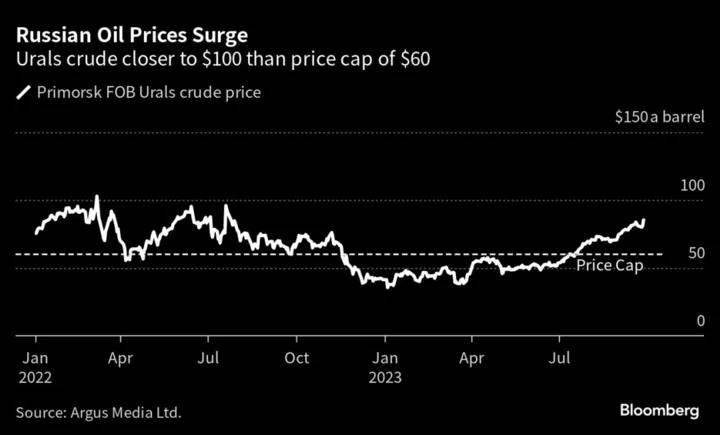
Ukraine Recap: Russia Launches Major Drone Attack From Crimea
Russia launched a large drone attack from Crimea overnight, sending about 40 loitering munitions, Ukraine’s air defence forces
2023-09-30 20:15
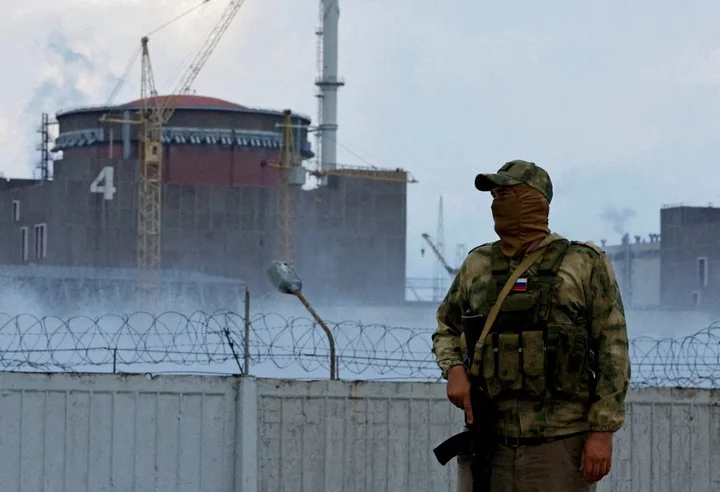
Ukraine-Russia war - live: Putin forces may have breached Romanian airspace during drone attacks
Nato member Romania said on Saturday morning Russia may have breached its airspace during attacks on southern Ukraine. The Kremlin has stepped up its attacks in Ukraine’s southern Odsea and Mykolaiv regions - near the border with Romanian - in recent days after exiting a deal allowing the safe passage of grain shipments via the Black Sea. “Following the detection of groups of drones heading towards Ukrainian territory near the Romanian border, residents in the Tulcea and Galati municipalities were alerted,” Romania’s defence ministry said in a statement. “The radar surveillance system ... indicated possible unauthorised entry into national airspace, with a signal detected on a route towards the municipality of Galati.” Earlier, Russian president Vladimir Putin ordered a former Wagner boss to take control of “volunteer units” and rejoin the frontline in Ukraine. Signalling the Kremlin’s intention to continue using the mercenaries following the death of Yevgeny Prigozhin, Putin told Andrei Troshev in a meeting late on Thursday that his task is to “deal with forming volunteer units that could perform various combat tasks, primarily in the zone of the special military operation.” Read More Ukraine ‘hits power substation’ in drone attacks on Russian border regions Putin’s shameless UN charm offensive - with stolen grain from Ukraine Russian figure skater Kamila Valieva's Olympic doping case will resume for two more days in November Ukraine's Zelenskyy taps celebrities for roles as special adviser and charity ambassador
2023-09-30 16:52
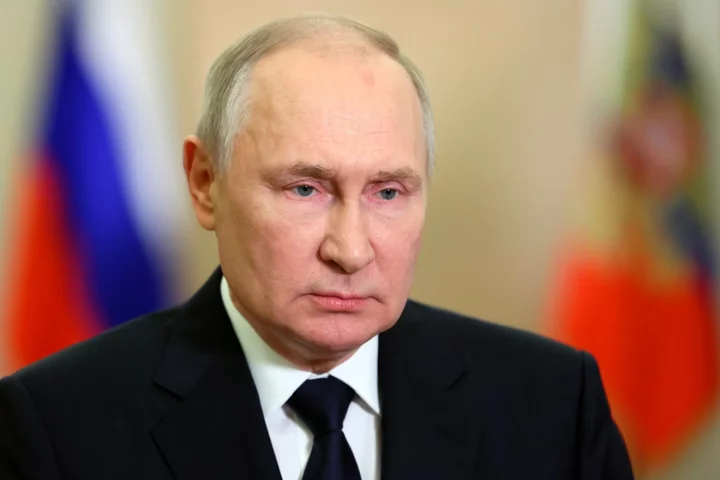
Putin marks anniversary of annexation of Ukrainian regions as drones attack overnight
Russian President Vladimir Putin on Saturday insisted that the residents of four Ukrainian regions that Moscow illegally annexed a year ago “made their choice — to be with their Fatherland.” In an address released in the early hours to mark the first anniversary of the annexation, Putin insisted that it was carried out “in full accordance with international norms.” He also claimed that residents of the Donetsk, Luhansk, Zaporizhzhia and Kherson regions had again expressed their desire to be part of Russia in local elections earlier this month, in which Russia’s Central Election Commission said that the country’s ruling party won the most votes. The West has denounced both the referendum votes carried out last year and the recent ballots as a sham. The votes were held as Russian authorities attempted to tighten their grip on territories Moscow illegally annexed a year ago and still does not fully control. A concert was held in Red Square on Friday to mark the anniversary, but Putin did not participate. Meanwhile, in Ukraine, air defenses shot down 30 out of 40 Iranian-made kamikaze drones aimed at the Odesa, Mykolaiv and Vinnytsia provinces overnight, the Ukrainian air force said Saturday. Vinnytsia regional Gov. Serhii Borzov said that air defenses shot down 20 drones over his central Ukrainian region, but that a “powerful fire” broke out in the town of Kalynivka when a drone struck an unspecified infrastructure facility. Romania’s Ministry of National Defense said on Saturday that a possible unauthorized entry into its national airspace occurred overnight amid the bombardment. It said the radar surveillance system of the Romanian Army detected “a possible unauthorized entry” into the national airspace of NATO member Romania, with a signal detected toward the city of Galati, which is close to the border with Ukraine. “At this moment, no objects have been identified that fell from the airspace onto the national territory,” the statement read, adding that NATO allies were informed in real time and that searches will continue through Saturday. Emergency authorities issued text message alerts overnight to residents living in the counties of Galati and Tulcea, after detecting what the defense ministry said was “groups of drones heading toward Ukrainian territory” near the border. In recent weeks, Romania has found drone fragments on its soil from the war next door at least three times as Russian forces carry out sustained attacks on Ukraine’s Danube ports. Russia’s Defense Ministry said Saturday that it had shot down nine Ukrainian rockets fired at its southern Belgorod region, which borders Ukraine. Local officials in Russia’s Bryansk region, also bordering Ukraine, reported disruptions to power supply following an unspecified attack on the town of Pogar. Drone strikes and shelling in the Russian border regions are a regular occurrence. ___ AP writers Stephen McGrath in Sighisoara, Romania, and Elise Morton in London contributed to this report. ___ Follow the AP’s coverage of the war at https://apnews.com/hub/russia-ukraine Read More Ukraine war’s heaviest fight rages in east - follow live Charity boss speaks out over ‘traumatic’ encounter with royal aide Pope creates 21 new cardinals who will help him to reform church and cement his legacy Slovakia election pits a pro-Russia former prime minister against a liberal pro-West newcomer UAE's president-designate for UN COP28 offers full-throated defense of nation hosting climate talks
2023-09-30 16:46
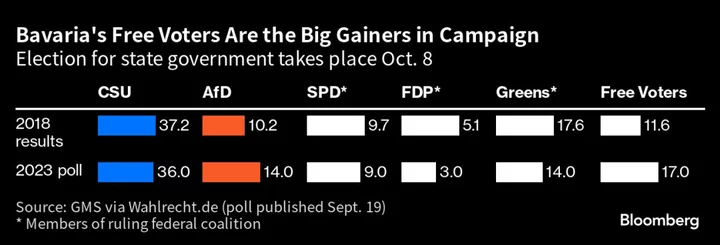
Nazi Barbs in Bavaria Revive Germany’s Struggles With Its Past
In downtown Munich, police cars blocked roads to a modern office building where security guards patrolled the halls
2023-09-30 16:23
